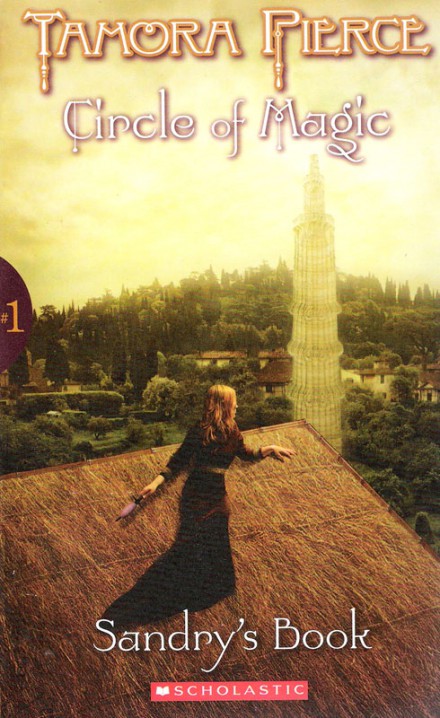Read An Excerpt
In the Palace of Black Swans, Zakdin, capital of Hatar:
Blue eyes wide, Lady Sandrilene fa Toren watched her near-empty oil lamp. Her small mouth quivered as the flame at the end of the wick danced and shrank, throwing grim shadows on the barrels of food and water that shared her prison. When that flame was gone, she would be without light in this windowless storeroom.
“I’ll go crazy,” she said flatly. “When they come to rescue me, I’ll be raving mad.” She refused to admit that, with this room locked from the outside and hidden by magic, a rescue was hopeless.
“I’ll draw the mob away from here, far away,” Pirisi had whispered through the keyhole, speaking in her native Tradertalk. “You’ll be safe until the smallpox has run its course. Then I’ll return for you.” But her nurse had never returned. Right outside the door, the mob had caught and killed her because she was a hated Trader. With Pirisi dead, no one would even know where Sandry had spent her last days.
Her light wobbled and shrank.
“If only I could catch it in something!” she cried. “Like Trader-wizards catch the winds in their nets—
“A net is string,” she interrupted herself. “And string is thread—”
She had thread in the workbasket she had grabbed when Pirisi dragged her from her room. The basket’s contents had kept her from giving up completely before this, as she embroidered until her eyes refused to focus. She had thread aplenty, in coils and in her work.
“I’m no mage,” she argued, resting her head on one hand. “I’m just a girl—a noble girl, worse yet. Like that maid said, ‘Good f’r naught but to be waited on and to marry.’ Good-for-naught, that’s me—”
Tears filled her eyes, making the lamp flame quiver even more.
“Crying won’t help!” she snapped. “I have to do something! Something besides weep and talk to myself!” She dragged her workbasket over. Fumbling, she yanked out three coils of silk, one green, one pale gray, one bright red. Swiftly, she arranged them: one in her lap, one to her left, one to her right.
The light was down to a blue core and its wavering orange skiret.
Gathering the ends of the threads in her left hand, she pulled them together in a knot, tying it as snugly as she could. Finding long dressmaker’s pins in her basket, she pinned the knot to a barrel to anchor it. Her fingers shook; sweat crawled down her face. She didn’t want to think of what would happen if this didn’t work.
Worse, there was no reason for it to work. Pirisi, the Trader and servant, had magic. Lady Sandrilene fa Toren was good only to be waited on and to marry.
“Nothing to lose,” she said, and took a deep breath. “Nothing at all.” Aboard the Trader ships their mimanders—mages—called to the winds as if they were friends who could be invited to stay. “Come on,” she told the dying flame. “Come here, won’t you? You’ll last in these threads longer than you will in that lamp.”
That lamp guttered. The flame was gobbling the few drops of oil that remained in its bowl.
The girl started her braid. The green thread wrapped around her fingers like a strangling vine. The gray slithered to the floor like a snake. The red tangled with itself.
“Uvumi—patience. It is everything,” Pirisi had often told Sandry. “Without patience magic would be undiscovered—in rushing everything, we would never hear its whisper inside.”
“Uvumi,” Sandry whispered in Tradertalk. She straightened the threads, one on each side, one in her lap. Closing her eyes, she found that she was much calmer when she couldn’t see her work or the lamp. She didn’t really need to see, to do something as easy as a braid. In her mind, her threads gleamed brightly. They called specks of light from all around her and tangled them in their strands.
The flickering lamp went out; she opened her eyes. The wick was dead and black. Through and around her braid, light shone steadily, filling the room with a soft, pearly glow.
“Did I know I could do that?” she whispered.
The braid-light wavered.
“All right,” she said, gathering the threads once more. “But I have to sleep, you know.” She wiped her eyes on her sleeve. With a whispered “uvumi, ” Sandrilene fa Toren went back to work.
In the southeastern Pebbled Sea:
When she sat up and looked at herself, Daja thought she was a ghost. Her skin was all sparkly white. Had an enemy mimander turned her from a brown Trader into a white one? Why on earth would anyone do such a thing?
She ran her swollen tongue over cracked lips, tasted salt, and grimaced at her own foolishness. This was no mimander’s doing. It was what happened when a sea-soaked girl went to sleep and didn’t wake until the sun was high overhead. She brushed herself off, salt flakes dropping onto her makeshift raft. White grains got into her many cuts and scrapes, where they burned like fire.
Her family ship was gone, sunk in a storm that their mimander could not stop or get rid of. The Trader god, Koma, known for peculiar acts, had chosen Daja to be the only one left alive, floating on a square wooden hatch cover.
All around her lay a spreading pool of wreckage. She saw tangles of rope and lumber, shattered crates, smears of color that were precious dyes from their cargo. Bodies also drifted there, the silent remains of her family. Daja’s lips trembled. How long would it be until she joined them? Should she jump into the water now and end it? Drowning was quicker than starvation.
Something thumped nearby: an open leather chest slammed against a mast. Again it thumped against the wood as water swelled, then flattened beneath it. She could just glimpse its contents, some bundles and dark glass bottles. It was what Traders called a suraku—a survival box. They were kept everywhere on the ships. She had to get it, and she prayed that its contents weren’t soaked or ruined.
Daja reached out. The box was beyond her grasp. She looked around for a long piece of wood to grab it—with no luck. Water surged in another slow roll, and her raft moved away from the wreckage. The box stayed behind.
“No!” she cried. “No!” She strained to grab that precious thing, though yards now lay between her and it. “Come here! Come on, I—I order you!” She half-laughed, half-cried to hear such foolishness. “Come on,” she whispered, as she had when she coaxed the ship’s dogs to come to their food bowls. She was not very old, after all—she did not want to die. Tears rolling down her cheeks, she reached out and twitched her fingers as if she were beckoning to her pets.
Later she would wonder if she had just imagined it, being crazy with the sun and terrified of death. Now she stared, jaw dropping, as the box pulled away from the mast and floated toward her. It stopped twice along the way. Both times she wiggled her fingers, afraid to move anything else. Both times the box came forward, until it bumped her hand.
Very, very carefully, she drew her prize onto the hatch cover. It was indeed a suraku, lined with copper to keep the damp out and life in. The bundles were oiled cloth, to keep their contents dry. The corks in the bottles had wax seals. Gently she felt through everything and grabbed a bottle. It took nearly all her strength to wriggle the cork out. When it popped free, liquid sprayed onto her face. Fresh water! Greedily, she drank most of that bottle before she came to her senses. If she guzzled it all now, there would be less for tomorrow. She had to save it. She fumbled to put the cork back in. Inspecting the other bottles, she saw they also held water.
“Thank you, Trader Koma,” she whispered to the god of deals and rewards.
In the bundles she found cheese, bread, apples. She ate carefully, in tiny bites, as her lips cracked open and bled. All thought of the future had vanished: for right now, she was gloriously alive.













